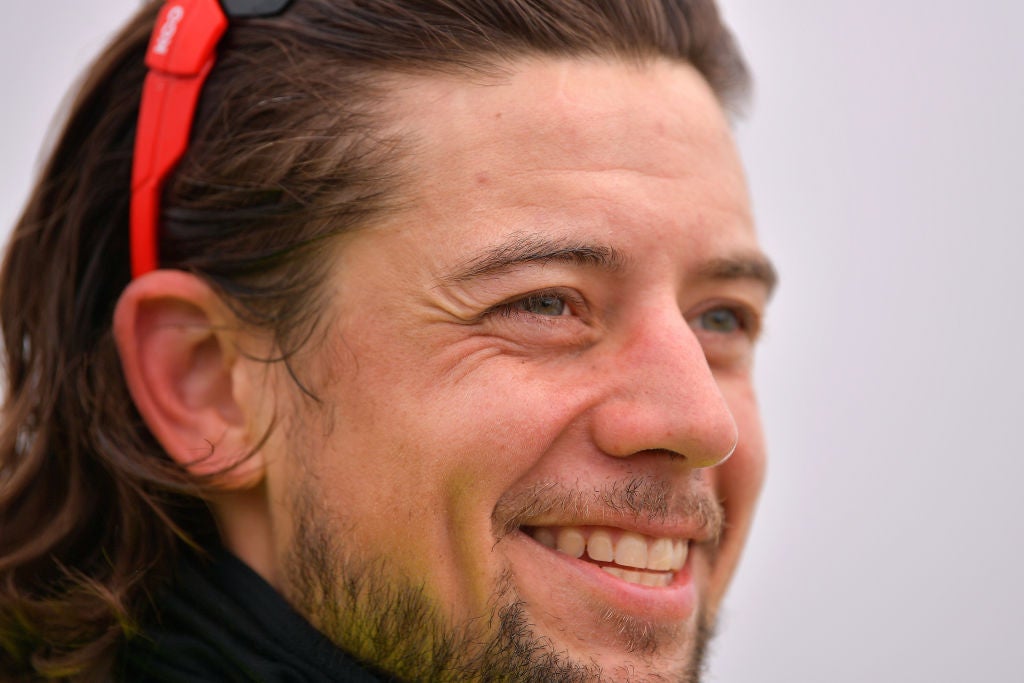Reijnen on pro cycling's generational shift: "It's inspiring"

ALTO DE LA CUBILLA. LENA, SPAIN - SEPTEMBER 09: Arrival / Kiel Reijnen of The United States and Team Trek-Segafredo / during the 74th Tour of Spain 2019, Stage 16 a 144,4km stage from Pravia to Alto de La Cubilla. Lena 1690m / #LaVuelta19 / @lavuelta / on September 09, 2019 in Alto de La Cubilla. Lena, Spain. (Photo by Justin Setterfield/Getty Images)
Pro cycling is undergoing a generational shift, with young up-and-coming riders such as Tadej Pogačar, Remco Evenepoel, and Egan Bernal all rising to the front of the peloton.
Veteran Kiel Reijnen (Trek-Segafredo) had a front-row seat for this shift at the recent Vuelta a España, where Pogačar, just 20, won three stages, Sergio Higuita, 22, also took a stage.
Now 33, Reijnen believes the shift represents talent usurping hierarchy, and the erosion pro cycling’s long-held beliefs about paying your dues to slowly rise through the ranks.
“It’s inspiring to see the young guys come in and immediately rise through the ranks and have an impact,” Reijnen told VeloNews. “The younger riders are having more freedom from their teams to go for results. Whereas in the past, you had to earn that privilege through time of being a domestique. You had to earn that privilege.”
Reijnen worked his way through the ranks the old-school way. He toiled for years on U.S. teams, turning pro in 2008 and working as a domestique and honing his racing craft, before getting his chance to shine. On the back of strong results, he made the jump to the WorldTour in 2016 at age 29.
These days, talented young pros are suddenly seeing an open rode to race for results. Gone are the days of paying your dues and waiting your turn.
“Before, it was really hard to break-in and have a chance to race for results. Some of those rules have dissipated, and that’s a good thing,” he said. “Before, you waited for your leader, whether you were better than him or not. And now we’ve seen some of those unwritten rules disappear.”
Reijnen, who recently extended to stay two more seasons with the U.S.-registered WorldTour team, was impressed by the rise of Pogačar through the Spanish grand tour that saw other young riders, such as Higuita (EF-Education First), Sepp Kuss (Jumbo-Visma), and Fabio Jakobsen (Deceuninck-Quick-Step), all make a splash.
Teams across the peloton are embracing youth. From Pogačar at this Vuelta, to Egan Bernal winning the Tour de France at 22 with Team Ineos, to Remco Evenepoel (Deceuninck-Quick-Step) taking honors at 19 at the Clásica San Sebastián, it’s obvious something is going on.
For Reijnen, it’s more than just the breakdown of some of cycling’s unwritten rules and tradition, but also a renewed focus on science as well as improved training. Power meters and technology have helped coaches and team managers spot talent earlier and easier than ever before.
“There are countries that are doing a better job of finding talent and developing it,” Reijnen said. “And teams are spending time, money, and resources on that. Today, pure talent is getting chances to perform earlier.”
Reijnen, who is transitioning into a captain’s role at Trek-Segafredo, admitted it’s not always easy being on the suffering end of this youthful explosion of talent.
“It’s a bit demoralizing to see guys a fraction of your age up the road, smashing it and you’re hanging on for dear life,” he said with a laugh. “I don’t think it’s a bad thing to see young guys performing really well. I think that’s a healthy thing.”
But just as the breakdown of some of cycling’s traditions is opening the road for young talent, it’s also creating some unexpected consequences as well. For example, there are rarely easy “piano” moments in any grand tour. Respect and hierarchy also brought order to an unruly bunch. These days, it’s full-gas from start-to-finish in just about any race on the WorldTour. Riders bemoan a loss of respect and pecking inside the peloton, a change that some say leads to more crashes and unnecessary risk-taking.
Many also said in this Vuelta was missing a respected, established pro who could impose order on the bunch, especially when it came time to organize a “gruppetto” on the climbing stages in order to make the time cut. There was never a big group of riders eliminated during this Vuelta for missing the time cut, but Reijnen said it was far from easy.
“There are definitely moments where it’s every man for himself,” Reijnen said. “There is a part of me that wishes there was a ‘gruppetto boss’ who could make that call. There are moments when you’re going as hard as you can, and that’s your only choice.”
Reijnen said these inside-the-peloton changes are all part of the larger evolution of the sport. Every race counts. There are no more preparation races. Every team wants something out of every part of the calendar.
“The gap between the top guys and the bottom guys has shrunk,” he said. “And when those margins get too small, it changes the dynamic of everything. There’s definitely no holding back anymore.”